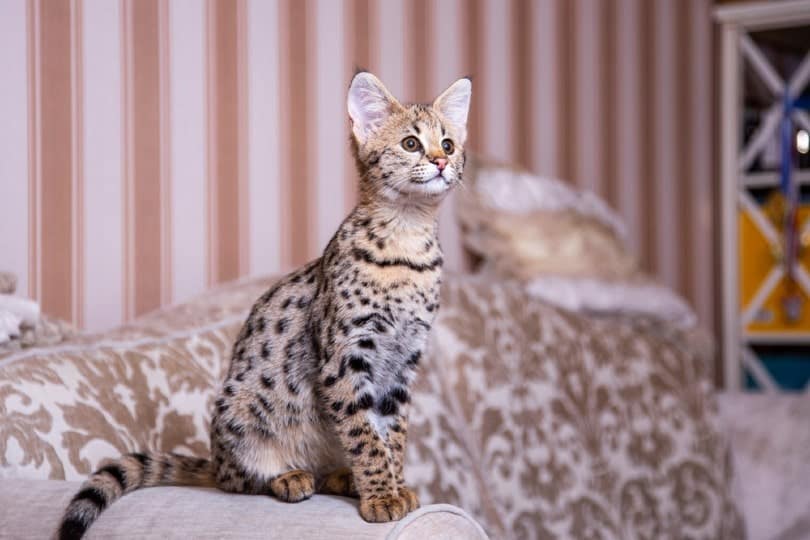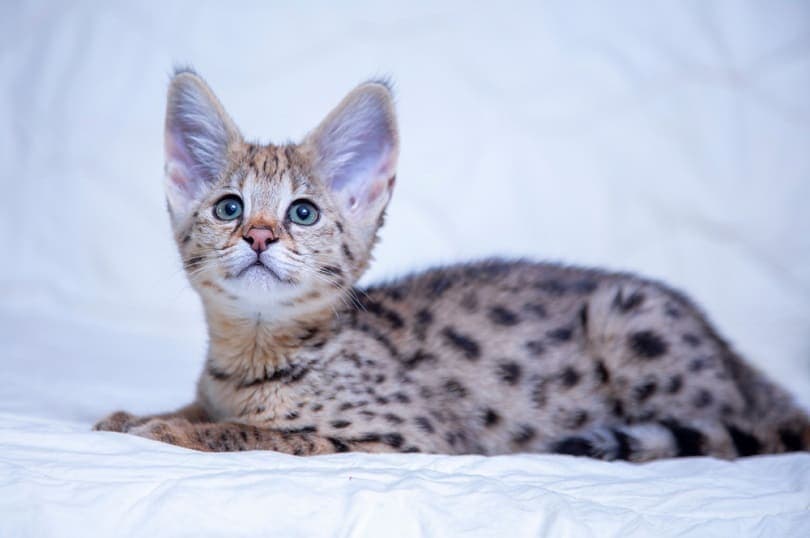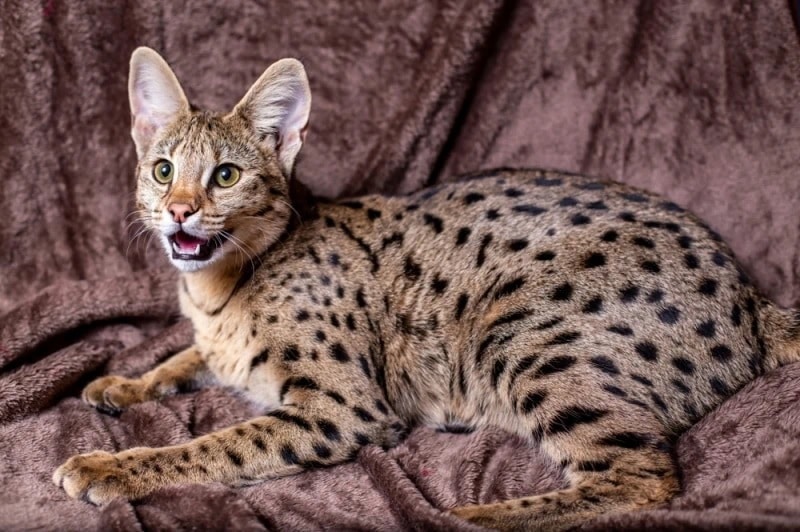Stryker is an internet-famous cat that was rescued by his owners, Shlomo and Joe, when they found him kept captive in a cage. Stryker’s life has taken a turn for the better, as he now has a huge following on social media. Stryker is never far from a camera these days and his antics and personality have attracted him millions of followers. He currently has over 850,000 followers on Instagram and holds the Guinness Book of World Records for the most followers on TikTok for a Savannah cat. He set the record at 5,705,605, as verified on 20 May 2020.
But you’re here for one reason only, and that’s to find out what kind of cat breed is Stryker? Stryker is a Savannah cat, and we’re here to explain everything you need to know about this unique breed.
What Is a Savannah Cat?
The Savannah Cat breed is a relatively new breed that is a cross between a domestic cat and an African serval. They are bred to have the physical characteristics of the Serval, such as their long legs, large ears, and spotted coat, as well as the more docile temperament of a domestic cat. They are a popular breed due to their exotic looks and personalities, but they can be extremely expensive, depending on their lineage. They are also known for being very friendly and outgoing cats, and they make great pets.

What Are the Characteristics of Savannah Cats?
Stryker’s breed information goes a long way toward explaining his most lovable traits. Stryker seems to be having the time of his life. He loves to play, and he is always up for a good game of catch. His personality is sweet, and his owners say that everyone who meets him just falls in love with him.
Savannah cats are known for loving water, and they will happily swim or take a shower or bath with you. While they are exceptionally affectionate animals and devoted to their owners, these cats retain their independence as well. The lower-generation Savannahs can eat regular cat food of high quality and use the litter box. Extreme intelligence, constant purring, high energy, and the ability to learn commands easily distinguish them from other cats. Savannah cat characteristics are more prevalent in the highest generation Savannah Cats—like Stryker—due to their African serval blood.
What Is a Serval Cat?
If Stryker is half-serval, then we should find out what that means. Serval cats are a unique species of wild cats found in Africa. They are the smallest of the African serval cats and have a very distinctive appearance with long legs, a small head, and large ears, which help them to hear prey from a distance. Servals hunt small prey such as rodents, birds, and reptiles, and they can leap high into the air to catch their prey. They are solitary animals that live in grasslands and savannas.

What Is an HP F1 Savannah Cat?
Stryker is a HP F1 Savannah Cat. The first-generation cross between a Serval and a domestic cat is called an F1 Savannah. If one parent were a domestic cat and the other a Serval, then the percentage of Serval genetics would be 50-50. In modern-day breeding, the Serval is often crossed back to a lower-generation savannah cat, for example, F3 or F4. This makes the Savannah have a “higher percentage” (HP) of Serval genes. So, an HP F1 cat such as Stryker has a high percentage of Serval genetics and one purebred Serval parent.
Are Cats Like Stryker Common?
Savannahs of the F1 generation are difficult to breed. The reason for this is the significantly longer gestation periods in servals as compared to domestic cats: 75 days for a serval and 65 days for a domestic cat. There are also genetic differences between the sex chromosomes of the two species. Many pregnancies are aborted or absorbed, or kittens are born prematurely. Servals can be very picky when it comes to choosing mates and often will not mate with domestic cats.

How Much Is a Cat Like Stryker Worth?
The cost of a Savannah cat can vary depending on the breeder and the characteristics of the cat. Generally, the cost ranges from $5,000 to $15,000. The average cost for an HP F1 Savannah cat, such as Stryker, is around $10,000. Many factors can affect the price of a Savannah including their color, generation, and breeder. The cost of a Savannah can also vary depending on the region you are in. Some breeders may charge more for cats located in a more populated area.
There are some lower-cost options available, but be sure to do your research to ensure you are getting a quality kitten from a reputable breeder. Stryker’s parents got lucky as they rescued him, but because of the high price, it’s extremely unusual to find Savannahs at an animal shelter.
What Kind of Diet Do F1 Savannah Cats Like Stryker Eat?
If you follow Stryker you’ll know he eats a lot of raw chicken. From drumsticks to full carcasses, he can often be seen crunching through bones and ripping up flesh online. F1 Savannah cats require a raw diet primarily containing chicken and some ground beef. Generally, breeders don’t feed raw meat with bones to F1 Savannah cats until they are one year of age. This is because kittens’ baby teeth aren’t suited to the rough work of splintering bones with their jaws.
Is Stryker the Cat Dangerous?
Stryker’s owners vouch for his safety—he is a harmless, loving cat. However, on April 6, 2022, Stryker got out and went for a walk around his neighborhood, alarming local residents who thought he was a fully wild escaped animal. Stryker’s owner said that although he may seem aggressive when he eats, he is “just a big love bug”.
As to the larger question of whether Savannahs are dangerous—there is no simple answer to this question as it depends on the individual Savannah cat in question. Some Savannah cats may be more aggressive than other breeds of cats, while others may be more docile. It is important to remember that a very large part of Savannah cat genetics is from wild felines, and as such, they should not be treated lightly. Proper care and training of a Savannah cat are essential to ensuring that both the cat and the owner remain safe and healthy.
Conclusion
In conclusion, Stryker is an HP F1 Savannah cat. The Savannah cat breed is a unique and special cat that is perfect for those who are looking for an exotic pet. They are friendly, playful, and make great companions. If you are interested in adopting a Savannah cat, be sure to do your research and find a reputable breeder to ensure that you are getting a healthy and well-socialized cat.
See Also:
- What Kind of Cat Breed Is Beluga? Influencer Interesting Facts
- What Kind of Cat Breed Is Walter from the Chevy Commercial? Feline History on the Media
Featured Image Credit: Kseniya, Shutterstock











